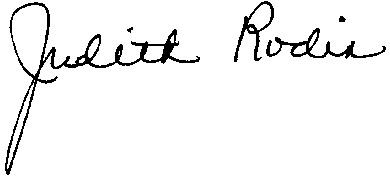
FROM THE PRESIDENT
Welcome Back
Welcoming Penn's New Provost
We open the spring semester at an auspicious moment in the University's history with the appointment of a new Provost, Penn's 32nd since it was founded by Benjamin Franklin in 1740. A renowned scholar and respected academic leader, Robert L. Barchi, M.D., Ph.D., will be an eminently worthy successor to the illustrious Provosts who have gone before him, and I was delighted to announce his appointment just before the holidays.
Having been a Provost myself, I told Bob without hesitation that it is a wonderful job, and one that is exceptionally important to the future of our institution. In this column today, I would like to say something more about why this is so--and about why Bob Barchi will be such an outstanding addition to Penn's leadership team.
The role of the Provost has evolved with the University over the course of three centuries. When Penn was founded, the Provost was the principal officer of the University. The title, which originated in the Middle Ages, referred to the chief dignitary of a collegiate or cathedral chapter of scholars, but in early modern times the title was given to the chief magistrate of a Scottish burgh. At Penn, the term was undoubtedly chosen to invoke the Scottish Enlightenment and the University's ties with Edinburgh. After Rev. Dr. William Smith, from Scotland, was appointed Provost by Franklin in 1754, the term came into usage at colleges and universities in America.
In the late 1800s, the Provost's purview began to extend to the new professional schools that were being founded at Penn. This included oversight of faculty appointments and issues of academic freedom, decisions on curriculum and degree requirements. During the tenure of Edgar Fahs Smith (1911-20), the Provost became fully responsible for the University's educational affairs. When the Trustees established the Office of the President in 1930, the Provost formally became the University's chief academic officer.
The Provost's responsibilities today include close, collaborative work with the faculty, and with deans, vice provosts, and directors, which results in policy development and implementation in the schools, academic departments, research programs and libraries--as well as in academic support services, admissions, financial aid, and student life. The Provost's leadership provides the foundation for a strong and vital teaching and research institution.
The Office of the Provost requires stellar scholarship and leadership, and Bob Barchi has those qualities in abundance. A deeply respected member of our faculty since 1974, he has been awarded the highest honors in his field and brings a quarter-century of expertise at Penn to the position. He has great and deep enthusiasm and respect for academic life and embraces the core values of a world-class teaching and research university.
On February 1, when he assumes office, Provost Barchi will take his place among some of Penn's true luminaries. In particular, he will follow in the tradition of the venerable Jonathan E. Rhoads, M.D., and the late Eliot Stellar, Ph.D., both of whom drew on their expertise in our School of Medicine during their Provostial leadership of the University.
Scholar, teacher and leader--Bob Barchi is ready and eager to take on the challenge of Penn's academic leadership. He will lend new spirit and dynamism to current projects and bring vision and energy to future ones. I have the greatest confidence in him, and I look forward to a partnership that will further Penn's tradition of academic innovation and excellence. As I welcome you back, please join me in welcoming our new Provost.

Almanac, Vol. 45, No. 16, January 12, 1999